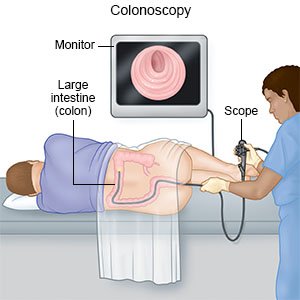Colonoscopy in Children
Medically reviewed by Drugs.com. Last updated on Aug 4, 2025.
A colonoscopy is a procedure to look at the inside of your child's colon (intestine) with a scope. A scope is a long, flexible tube with a light and a camera on the end. The camera is attached to a monitor that allows your child's healthcare provider to see inside the colon. Your child may need a colonoscopy to look for inflammatory bowel disease or to remove tissue growths. Your child may also need a colonoscopy if he or she has chronic diarrhea or abdominal pain.
 |
DISCHARGE INSTRUCTIONS:
Seek care immediately if:
- Your child has a large amount of bright red blood coming from his or her rectum or in bowel movements.
- Your child's stomach is very painful, feels hard, and is larger than usual.
- Your child does not have a bowel movement for 3 days after the procedure.
Related medications
Call your child's doctor if:
- Your child has a fever or chills.
- Your child is nauseated or is vomiting.
- Your child's skin is itchy, swollen, or has a rash.
- You have questions or concerns about your child's condition or care.
Care for your child:
- Limit your child's activity to prevent bleeding. Have your child lie on the couch or rest quietly until the day after the procedure. He or she should not play sports or do vigorous activity after the procedure. Ask your healthcare provider when your child can return to normal activities.
- Relieve your child's gas and discomfort. Have your child lie on his or her left side. Your child may need to take short walks to help move the gas out. Give your child small meals until the bloating improves. Start with clear liquids such as juice. If your child does okay with clear liquids, start giving his or her usual foods. Ask your child's healthcare provider if your child needs to be on a special diet.
Follow up with your child's doctor as directed:
Ask your child's healthcare provider when and how you will get the test results. Write down your questions so you remember to ask them during your child's visits.
© Copyright Merative 2025 Information is for End User's use only and may not be sold, redistributed or otherwise used for commercial purposes.
The above information is an educational aid only. It is not intended as medical advice for individual conditions or treatments. Talk to your doctor, nurse or pharmacist before following any medical regimen to see if it is safe and effective for you.
Learn more about Colonoscopy
Treatment options
Symptoms and treatments
Further information
Always consult your healthcare provider to ensure the information displayed on this page applies to your personal circumstances.
